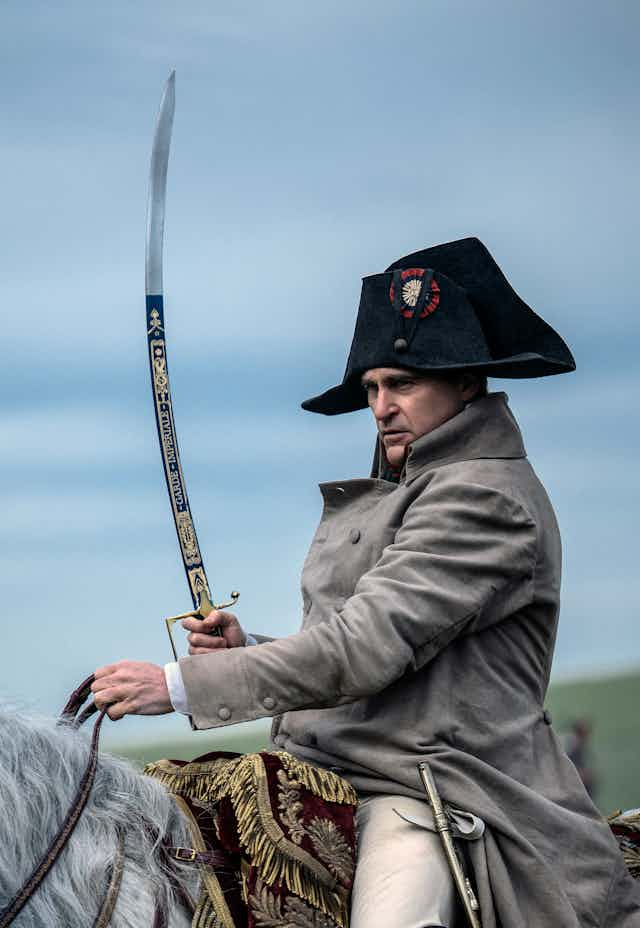There have been more than 60,000 books written about Napoleon since his death in 1821. Cinema too has been drawn to him time and again.
The Lumière brothers made a short film in 1897 and he featured in the mostly lost British film The Battle of Waterloo (1913). Already, the standard image of Napoleon was established: the squat frame, the horizontal hat, the arms behind the back.
There have been more than 100 incarnations on screen since.
Now, Ridley Scott’s latest charts the rise of the lowly artillery officer who became Emperor of France. All Scott’s usual components are in place: meticulous world-building, visceral combat scenes and a devil-may-care attitude to historical accuracy. But how does it stand up to its predecessors?
Cinema’s love affair
In 1927 came the monumental Napoleon, directed by legendary Abel Gance, which has acquired a mythic status in France.
Gance initially planned to make six films focusing on a particular part of Napoleon’s life, but ended up focusing on Napoleon’s rise and his victorious campaign in Italy. A restoration of the seven-hour original is being partly funded by Netflix to be released in 2024.
Napoleon is often depicted as a fish-out-of water comic character – one of most memorable moments in Bill and Ted’s Excellent Adventure (1989) was a time-travelling Napoleon hanging out at a bowling alley and eating ice cream.
Longstanding myths are often played for laughs. In Night at the Museum: Battle of the Smithsonian (2009), Ben Stiller tells Napoleon “There’s a complex named after you … you’re famous for being little” while the so-called “Napoleon Delusion” – a mental illness in which a person believes they are Bonaparte himself – features as a plot device in Stan Laurel’s delightful Mixed Nuts (1922).
Marlon Brando played him as a kind of soap opera star in the Technicolor biopic Desirée (1954). Brando – who earlier that year played a sweaty, muscular Stanley Kowalski in A Streetcar Named Desire – completely transforms into an exact replica of Napoleon, complete with clipped diction and a ponytail.
Most of the film unfolds in drawing rooms and at decorative society balls, far away from the battlefield and focuses on his relationship with Bernardine Eugénie Désirée Clary, the queen of Norway and Sweden.
Rod Steiger’s performance in Waterloo (1970) returned Napoleon to the theatre of war, where he played him as a bad-tempered bully.
He’s since gone up against Bugs Bunny, Blackadder and Bewitched.
These earlier incarnations are less focused on the Great Man myth and more interested in Napoleon the lover, the politician and the irascible Frenchman. Scott returns us to a much more complex and convoluted version. Helped by an impressive array of CGI effects, Scott’s and Joaquin Phoenix’s Napoleon is a mix of clear-sighted strategist and cuckolded buffoon.
A whirlwind view of history
The tagline for this latest incarnation is “He came from nothing. He conquered everything”.
Over two and half hours, Scott and screenwriter David Scarpa show us exactly how. They sweep breathlessly through 30 years of French history, starting in 1793 and the guillotining of Marie Antoinette before a bloodthirsty mob.
Then, in rapid succession, come Napoleon’s triumphs at Toulon, Egypt and Borodino, stunning examples of tactical acumen and military innovation and finally his exile to Elba, return and eventual defeat at Waterloo.
Scott’s films are not known for their focus on psychological motivation or character depth. So his decision to chronicle much of Napoleon’s volatile relationship with French aristocrat Josephine (Vanessa Kirby) in an awkwardly comic manner is a misstep. The account of their passionate and often mutually destructive relationship is the weakest part of the film, and features the oddest line: “Destiny has brought me this lamb chop”.
Scott, who has given us the tough Ripley, G.I. Jane and Thelma and Louise reduces the always excellent Kirby to a passive bystander.
Read more: Napoleon and Josephine’s real relationship was intense – but they loved power more than each other
He is on much surer footing when depicting strategies, battles and geopolitical rivalries. The confrontation (which never actually happened) between the Duke of Wellington and Napoleon onboard HMS Bellerophon after Waterloo is a blend of machismo posturing and mutual admiration.
Phoenix does an excellent job at revealing Napoleon’s legendary strategic shrewdness as well as his petulant, often vainglorious stubbornness. He gets Napoleon’s look just right – the haircut, the bicorne, the thousand-yard stare.
The reviews have been mixed. But Scott doesn’t care. What has always mattered most to him, from Alien (1979) and Blade Runner (1982) right up to House of Gucci (2022) is visual panache and spectacle. He spent ten years as a commercials director in the United Kingdom before making his first film, and it shows.
We see epic recreations of Napoleon’s coronation as Emperor in 1804, the eerie scene of Moscow in flames and the pivotal Battle of Austerlitz, all shot with precision and verve.
It remains to be seen whether Scott’s Napoleon will be the definitive version. The director has promised a future release of a four-hour version for Apple TV+. Maybe this extra footage will allow a more consistent and balanced story to emerge.
The greatest movie never made?
Hollywood’s love affair with Napoleon is set to continue. Steven Spielberg announced earlier this year he was preparing an HBO mini-series based on a Stanley Kubrick screenplay abandoned in the 1970s. Before quitting the project, Kubrick did an astonishing amount of research on the film that would have starred Jack Nicholson and Audrey Hepburn.
Napoleon incarnates everything Hollywood looks for in a hero - genius, charisma, star quality, hubris, and the embodiment of the “comeback”. It’s no surprise his legend continues to grow.
And Scott, who turns 86 this week, now leaves 19th-century France behind to return to Ancient Rome in the sequel to Gladiator. Like Napoleon himself, Scott has more battles still to win.

